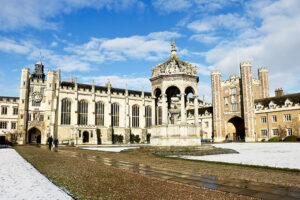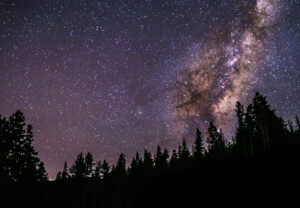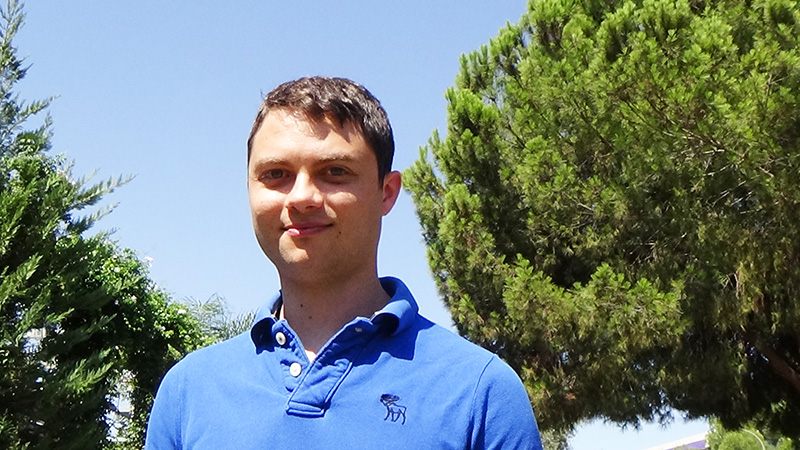THEO PANAYIDES meets a sharp mind probing the future of the universe in a bright – in a literal and intellectual sense – astrophysicist who is currently living life long distance, both in terms of work and play
Most profiles wallow in the past, this one looks to the future: one man’s future, our collective future – and indeed the future of the universe, which is what Savvas Constantinou is studying. “I figure I should flag this up at the start,” he says as we sit at a coffee shop near his home in Engomi, and takes out his phone to show me something.
Our timing, it turns out, is propitious: the day before our interview, both The Guardian and CNN ran stories on the 35-page paper on which Savvas has been working (as a member of a small team under the supervision of Dr Nikku Madhusudhan) for his PhD at the University of Cambridge. ‘‘Mini-Neptunes’ beyond solar system may soon yield signs of life’ is the headline of the Guardian piece – which goes on to explain that astronomers have habitually sought Earth-like planets when looking for life in the universe, yet the new avenue indicated by Madhusudhan and his team may be just as promising:
“They have now identified a new class of habitable exoplanets, called hycean planets – hot, ocean-covered and with hydrogen-rich atmospheres – which are more numerous and observable than Earth-like planets,” says the article. “The mini-Neptune known as K2-18b is one, and there could be many more in existence.”
It’s all very exciting – though the article exaggerates slightly, as articles do. In fact, the work being done (like most of the work in this field) is largely theoretical. Are ‘hycean’ planets common? We don’t really know, admits Savvas frankly, “we just said that they might exist, and it’s already been shown that one such planet is potentially like that”. It’s “presenting a hypothesis to be tested, rather than ‘We have found something’.”
Well, could human life thrive in a world that’s nothing but water?
“It’s not in the context of colonisation,” he explains. All these planets are light years away anyway (though ‘only’ tens of light years, for the most part, making them almost next-door neighbours on a cosmic scale). “I don’t expect us to be colonising these planets, or any Earth-like planets – definitely not in our lifetime.”
Well then, why?
He shrugs affably: “I think almost every human being has looked up at the sky and said, ‘Is there anything more out there?’”.
The field of astronomy (actually astrophysics, though the two are related) is a lot like that, research aimed at expounding hypotheses and amassing ideas more than anything. “In 2019, everyone was occupied with ‘hot Jupiters’,” notes Savvas, then the field shifted to ‘mini-Neptunes’. Data is always insufficient, the universe too vast to map reliably. “There’s a joke among astronomers: you ask an astronomer what they want, they’ll always say ‘A bigger telescope!’.” (The James Webb space telescope – the successor to Nasa’s Hubble, due to launch in October – will aid significantly in the search for life.) The future, one might say, is unknown: we could go on like this forever, trying to glean little nuggets of information on planets that remain out of reach – or we could achieve some technological breakthrough, learn to vault across space like they do in Star Wars, and suddenly the sky’s the limit. That’s why the field continues to attract the best and brightest.

Trinity College Cambridge
Savvas certainly fits that description, his CV placing him firmly in the top percentile when it comes to qualifications: a Double First followed by a First Class Master’s, both in Physics and from Trinity College Cambridge, a college with more Nobel Prize winners than the entire country of France. (Incidentally, a Double First means a person got a First in their final year and one other year, not necessarily – as I’d initially assumed – that their marks were stratospherically high; but still.) The word ‘bright’ is relevant here, denoting intelligence of course – his supervisor, Dr Madhusudhan, is “one of the brightest people I’ve ever met” – but also applying in a literal sense. Savvas literally beams; whether it’s youth, or confidence, or just the physical manifestation of a sharp, lucid mind, his face seems to glow as he sits across the table from me. It’s like talking to a light bulb.
He’s surprisingly pale-skinned, with green eyes and close-cropped light brown hair, a complexion that makes me wonder if he’s totally Cypriot (he is). “I’ve been getting this my entire life! My mum’s background is from Lefkara, and apparently people from Lefkara are really light-skinned… So it’s a lifetime of being asked at the airport if I enjoyed myself in Cyprus.” His laugh is merry and unforced, a trait which – in combination with his smooth, round face and exuberant energy – gives him a boyish air. “This is coming from minimal experience,” he says at one point, prefacing some observation about life in general, “but as a 27-year-old – wow, I’m 27!” he interrupts himself and laughs in wonder, the implication being that 27 is getting pretty close to retirement age. I nod sympathetically.
What’s interesting isn’t just the work he’s doing; it’s also Savvas himself – an ambitious, unusually accomplished member of a generation that’s been dealt a bad hand, even before the past year. “This is by far the biggest upheaval in my lifetime,” he admits, speaking of the pandemic. His own PhD isn’t lab-based, so his productivity hasn’t really been affected – but of course he’s had to work remotely, losing touch with his Cambridge crowd (they bond over video games) and leaving Cambridge altogether; he’s been here since December, on and off, though he plans to return, especially “if we ever go back to working face-to-face. Big ‘if’!”. Really? It might never happen? “Over the course of my PhD, that’s still an ‘if’,” he replies reasonably.
The PhD is one thing; but what about life in the quote-unquote real world? Savvas isn’t sure if he wants to stay in academia – he wasn’t even sure about doing a PhD, being more inclined to “go into banking or consulting or something like that”; his energy is more the go-getting business person’s than the dusty academic’s – but even if he does, will positions still be available in a world hit by Covid? And will there be jobs in the private sector? Society makes a promise to a young person: study hard, find a good university, then reap the rewards – but what rewards are millennials supposed to reap, especially post-pandemic? This is the generation who’ll probably never be able to afford their own home. Does a brilliant 27-year-old with a Double First and a First Class Master’s feel betrayed by the system, at all?
The answer, surprisingly, seems to be ‘No’ – maybe because the question is simplistic. The problem isn’t wholly generational, and not all 27-year-olds are created equal; what we have is more of a two-track world, designed for the flexible and globally minded (especially if they come from a top university). His peers in Cyprus do seem a bit pessimistic, says Savvas, but his Cambridge pals “are a particularly footloose bunch”, not tied to any one country. “They have a parachute, where, if things go wrong in the place where they live, they’ll emigrate and go wherever they want – and they know they’ll easily find an employer who’ll say, please come over. One of my friends just said ‘I think I’ll go stay in Hong Kong for a bit’. He’s now in Hong Kong”.
Savvas’ world – like the work he’s now doing – is fluid, mutable, slightly abstracted. He works remotely, as already mentioned, and considers it an upside of lockdowns that remote working has been “normalised”. Nationality doesn’t mean very much, Cambridge being a meeting of brilliant minds from all over the world. (Savvas recalls his undergraduate interview, and the sudden realisation of being in a room with intellectual heavyweights for the first time in his life: “I hadn’t realised that smarts can be a superpower till I was in that room with them!”.) His supervisor is Indian, the third member of the team – another PhD student – half-Indian, half-Belgian. Savvas’ girlfriend is Croatian but born in Australia; she now works in Switzerland, and they’ve been long-distance for a few years – just like his work is long-distance, and the gaming with friends is long-distance. Would he prefer to have been born 20 years earlier? “If my plan was to come back to Cyprus, yes,” he replies, making clear that it probably isn’t.

Fortunately, this millennial loves a challenge – indeed, he’s forever driven to pursue the subjects where he’s let himself down, till he gets them right. It’s notable (speaking of the past, for a change) that he failed his entrance exam for the English School in Nicosia as a pre-teen, having done badly in Maths (!), then later got his lowest mark at Cambridge in Exoplanets – so he promptly did a Master’s in Exoplanets, and determined to take the English School exam again the following year (he came second). He’s “kind of stubborn,” admits Savvas, that being perhaps his defining trait – though only in terms of being persistent, not rebellious or confrontational. Has he ever had a problem with authority? “I don’t think so. If anything, I want authority to like me.”
He comes off as the archetypal ‘good kid’: cheerful, responsible, clean-cut, conscientious. There are no casual f-bombs in our conversation, though we do get a couple of ‘Holy cow’s. (“Holy cow, that guy’s doing awesome stuff!” he recalls thinking when he first heard about Dr Madhusudhan.) At school, he discussed big ideas at the Model UN and European Youth Parliament, and was on the organising committee for Talent Night. He was a lieutenant in the army, and worked hard at Cambridge even in the first years (hence his Double First), when most people party – though he’s sociable too, in no way a loner. He works out, and is serious about keeping fit. He’s somewhat risk-averse (he wasn’t necessarily against lockdown, indeed his objection is that – having decided to lock down – the UK didn’t lock down enough), and a little bit cautious: “I can be a bit – uptight about things”. He’s always been active, never a slacker, always wanting to do stuff, always on very good terms with his teachers. “I always want people to think highly of me.”
Bottom line? Savvas Constantinou is a high achiever, a likeable lad, and exactly the type you’d expect to excel in Cambridge, and in life – though not necessarily the type you’d expect to be probing the mysteries of the cosmos. On the one hand, it makes perfect sense: “I wanted to do something more,” he says of his work – and what could be ‘more’ than the universe itself, the search for life, the quest for reassurance that we’re not, ultimately, alone? (Even if the only other life are aquatic organisms on mini-Neptunes.) On the other, he seems like a man who admires order – and the universe is a dark, entropic mess, indeed it’s practically a law (the Second Law of Thermodynamics, to be precise) that any system tends towards disorder. Spitefully random, indeed.
The world too is something of a mess nowadays, with its battered economies and vaccine passports – but Savvas seems quite sanguine, even if it’s just the optimism of youth. “I like to think I have been extremely lucky,” he beams. “I’ve been given the tools to pursue anything I want, and do exceptionally well at it.” His parents, his background, his education, his own capacity for hard work: all played a part – but of course the future starts now. We say goodbye, two tiny specks in a mad hurtling universe.







Click here to change your cookie preferences